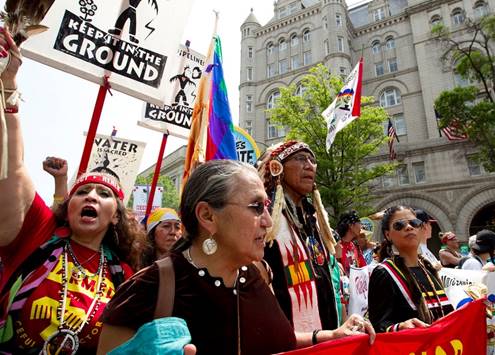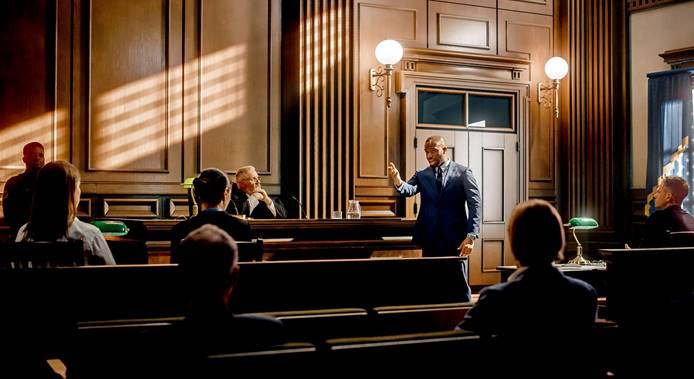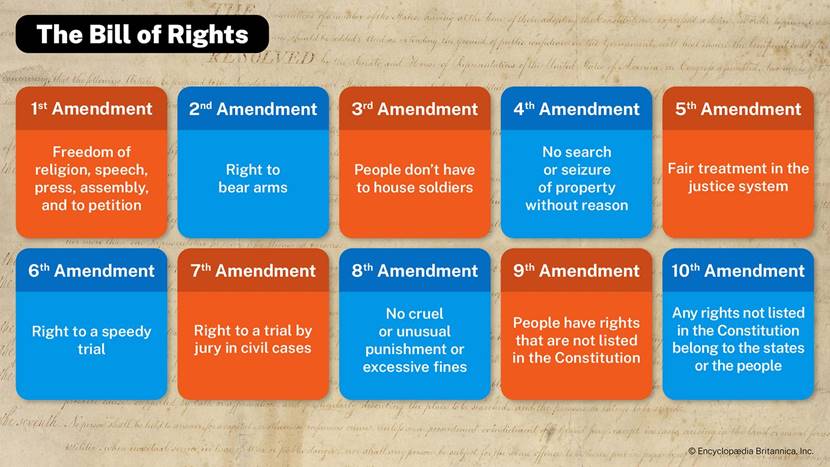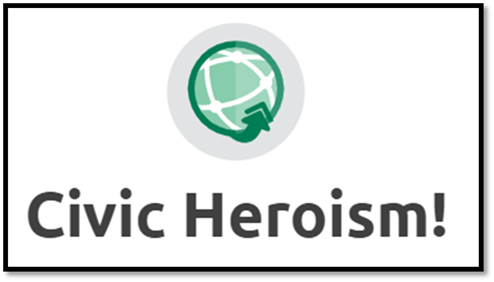
Constitutional Democracy
Learning Objective
In this unit, you will apply history and social science
skills to explore and understand the significance, reverence, and pride around
the foundation of the American Republic by describing the fundamental concepts
of American constitutional democracy, defining the meaning of the American
Creed that calls on citizens to safeguard the liberty of individual Americans
within a unified nation and evaluate how the U.S. Constitution and the Bill of
Rights protect freedoms and limit government.
At its core, American
constitutional democracy is a form of government in which the rule of law and
the rights of individuals are paramount. This system is guided by foundational
principles, ensuring that the government serves the people's will while protecting
individual freedoms.
Here are some of the key concepts:
1.
Popular Sovereignty: This
principle underscores that the ultimate source of authority in a democracy is
the people. In simple terms, the government's power is derived from the consent
of the governed. Through elections, citizens choose representatives who will
make decisions on their behalf. This ensures that government actions align with
the majority's will while respecting minority rights.
2.
Primacy of Individual Liberty: Liberty,
or the state of being free, is a cornerstone of American democracy. The
government is designed to protect the inherent rights of its citizens, allowing
them the freedom to express their beliefs, pursue happiness, and live without
undue interference. This doesn't mean there are no limits; individual freedoms
are balanced against the need to maintain public order and the rights of others.
3.
Rule of Law: This
concept ensures that laws, rather than the arbitrary decisions of rulers,
govern the nation. Everyone, including government officials and institutions,
is accountable to the law. This accountability ensures transparency and
fairness, preventing misuse of power and safeguarding citizens' rights.
4.
Separation of Powers: The U.S.
Constitution divides the government into three branches: the Legislative
(Congress), the Executive (President), and the Judicial (Supreme Court). This
separation ensures that no single branch becomes too powerful. Each has its
unique roles and can check and balance the powers of the others.
5.
Checks and Balances: Each
branch of government has some level of influence over the other branches. For
instance, while Congress passes laws, the President can veto them, and the
Supreme Court can rule on their constitutionality. This system ensures that
power is distributed and that one branch can't overstep its bounds.
6.
Federalism: The U.S.
system divides powers between national and state governments. This allows for
flexibility, where local governments can address specific regional needs while
the national government handles broader issues that affect the entire country.
7.
Protection of Minority Rights: While
majority rule is an essence of democracy, protecting the rights of minorities
is equally crucial. American constitutional democracy ensures that the voice of
the majority doesn't suppress the rights and interests of minority groups.
Understanding these foundational
concepts is crucial to grasping how American constitutional democracy
functions. It emphasizes a delicate balance between the collective will of the
people and the preservation of individual rights and liberties.
The American Creed isn't a single,
definitive document nor a set of rigid rules set in stone. Instead, it's an
evolving set of beliefs, values, and principles that have, over the centuries,
come to define the American national character and the shared ethos of its
people.
At the heart of this Creed is a
call to safeguard individual Liberty, respect the rule of law, and cherish the
U.S. Constitution.
Let's explore these tenets more
closely.
Safeguarding Liberty within a Unified Nation:
The essence of the American dream
is predicated on the freedom of individuals to pursue their aspirations. Yet,
this Liberty doesn't stand in isolation. The American Creed emphasizes cohesive
unity, suggesting that while every individual has the right to personal
freedoms, these should be exercised within the context of a united nation. This
unity amplifies the collective strength while ensuring diverse voices are
heard.
Respect for the Rule of Law:
The American Creed champions the
rule of law as the bedrock of a stable society. This means that all are equal
under the law regardless of their position or status. The "rule of
law" isn't just about obeying statutes; it's about respecting the
principles that ensure fairness, justice, and equality. By upholding these
principles, society can function smoothly, and conflicts can be resolved
amicably.
Preserving the Constitution:
The U.S. Constitution is often seen
as a "living document." It provides a framework for the government's
structure and enshrines Americans' fundamental rights and liberties. The
American Creed underscores the importance of preserving, protecting, and
defending this document, ensuring it remains a guiding force for future
generations.
The American Creed is both a
reflection of the nation's past and a beacon for its future. It encapsulates
the ideals that have defined the U.S. since its inception, urging citizens to
remain vigilant in protecting the core tenets that have made the nation unique.
Whether through civic engagement, education, or simply practicing everyday
kindness and understanding, every American plays a role in upholding this
Creed, ensuring that the nation remains, in the words of Abraham Lincoln,
"the last best hope of earth."
The Bill of Rights
The Bill of Rights, which
encompasses the first ten amendments to the U.S. Constitution, plays a pivotal
role in ensuring that the rights and freedoms of American citizens are
preserved and protected.

Being able to
protest is protected by the Bill of Rights.
© Jose Luis Magana—AFP/Getty
Images
This foundational document protects
against governmental overreach and safeguards citizens' civil liberties. With
the bitter memory of British colonial rule still fresh in their minds, the
framers of the Constitution designed the Bill of Rights to prevent potential
tyranny and protect individual freedoms.
The First Amendment: Central to American democracy is
the First Amendment.
It upholds the principles of:
·
Freedom of Religion: Ensuring that the government neither
establishes an official religion nor impedes citizens from practicing their
beliefs.
·
Freedom of Speech: Guaranteeing citizens the right to express
their opinions without fear of persecution.
·
Freedom of the Press: Protecting the right of the media to report
freely.
·
Freedom of Assembly: Permitting citizens to gather peacefully in
protest or for other purposes.
·
Right to Petition: Allowing citizens to voice complaints or
concerns to their government.
While the First Amendment guarantees
freedoms, these are not absolute. For instance, speech that incites violence or
spreads false and damaging information about someone can be restricted to
protect broader societal interests.
Second Amendment: "A well-regulated Militia,
being necessary to the security of a free State, the right of the people to
keep and bear Arms, shall not be infringed."
·
This Amendment protects the right of individuals to
keep and bear arms. Over the years, the interpretation of this Amendment has
been the subject of significant debate, especially concerning gun control
legislation and individual versus collective rights.
Third Amendment: "No Soldier shall, in
time of peace, be quartered in any house, without the consent of the Owner, nor
in time of war, but in a manner to be prescribed by law."
·
The Third Amendment addresses the quartering of
soldiers in private homes, a significant concern during the Revolutionary War
era when the British forced American colonists to house their troops. It
essentially means that, in peacetime, soldiers can't stay in someone's home
against the owner's will. Even in wartime, there are specific rules that need
to be followed.
Fourth Amendment: "The right of the people
to be secure in their persons, houses, papers, and effects, against unreasonable
searches and seizures, shall not be violated, and no Warrants shall issue, but
upon probable cause, supported by Oath or affirmation, and particularly
describing the place to be searched and the persons or things to be
seized."
·
The Fourth Amendment safeguards citizens from
unreasonable searches and seizures. Before law enforcement can search someone's
property or seize their possessions, they usually must have a warrant, which
must be based on probable cause. This Amendment is foundational to the American
concept of privacy and the legal procedures surrounding arrests, searches, and
seizures.
Fifth Amendment: Strengthens the justice system,
ensuring that individuals cannot be tried or punished without due evidence and
process. It also upholds the rights of individuals against self-incrimination
and guarantees just compensation when property is taken for public use.

The Fifth Amendment to the U.S. Constitution protects the rights of
defendants who have been accused of a crime.
© Gorodenkoff—iStock/Getty
Images
Sixth Amendment: Building on the principles of
justice, it promises a swift and fair trial for individuals and ensures they
have access to legal representation.
Seventh Amendment: "In Suits at common law, where
the value in controversy shall exceed twenty dollars, the right of trial by
jury shall be preserved, and no fact tried by a jury, shall be otherwise
re-examined in any Court of the United States, than according to the rules of
the common law."
·
This Amendment guarantees the right to a jury trial
in civil cases in federal courts. If the matter in dispute is worth more than
twenty dollars (a more significant sum at the time of the framers than it is
now), the parties involved have the right to have their case heard by a jury.
It also prevents courts from overturning a jury's findings of fact.
Eighth Amendment: "Excessive bail shall not be
required, nor excessive fines imposed, nor cruel and unusual punishments
inflicted."
The Eighth Amendment has three distinct
clauses, each of which limits the power of the judicial system:
·
The Excessive Bail Clause restricts judges
from setting bail at levels that would be impractical or overly burdensome for
the defendant. The idea is to ensure that bail serves its intended purpose (to
ensure the defendant returns for trial) without being punitive or exploitative.
·
The Excessive Fines Clause prevents the
government from charging unreasonably high fines. This is to prevent potential
abuse or punitive measures against individuals through economic means.
·
The Cruel and Unusual Punishment Clause is
the most debated part of the Eighth Amendment. It prohibits the government from
inflicting inhumane or grossly disproportionate punishments for the crime.
Discussions around this clause often arise in the context of capital punishment
and conditions of imprisonment.
Ninth and Tenth Amendments: Reiterate the principle of
limited federal power and decentralization. While the Ninth acknowledges rights
not explicitly mentioned in the Constitution, the Tenth confirms that any
powers not granted to the federal government reside with the states or the
people. This concept underlies diverse areas, from education policy to public
health.

The Bill of Rights is a testament
to the American ethos of freedom, justice, and decentralized power. Its ten
amendments serve as the bedrock of American civil liberties, protecting them
from potential governmental encroachment. The rights and freedoms enshrined in
this document have guided American democracy and society for over two
centuries, ensuring that individual liberties remain at the heart of the
nation's governance.
Key Terms
American Constitutional Democracy
1.
Popular Sovereignty: The principle that the government's authority originates from the
people. In essence, governmental power exists because of the people's consent,
primarily exercised through voting.
2.
Primacy of Individual Liberty: The fundamental notion that every citizen possesses inherent rights
and freedoms, emphasizing personal autonomy while maintaining societal harmony.
3.
Rule of Law:
The doctrine that every citizen, regardless of status, is subject to the law.
It promotes transparency, fairness, and accountability.
4.
Separation of Powers: The division of governmental responsibilities into distinct branches
(Legislative, Executive, and Judicial) to prevent the misuse of power.
5.
Checks and Balances: A system ensuring each branch of government can regulate the other
branches' functions, maintaining a balance of power.
6.
Federalism:
The distribution of power between the national government and state
governments, ensuring governmental versatility and adaptability.
7.
Protection of Minority Rights: While majority rule is essential in a democracy, safeguarding
minority rights ensures that no group is oppressed or marginalized.
The American Creed
8.
Safeguarding Liberty within a Unified Nation: While personal freedoms are celebrated, they are exercised collectively,
emphasizing national unity.
9.
Respect for the Rule of Law: A dedication to the principles that guarantee fairness, justice, and
equality, ensuring societal stability.
10.
Preserving the Constitution: Recognizing the U.S. Constitution as a dynamic, guiding force that
shapes the nation's governance and upholds its foundational principles.
The Bill of Rights: Key Terms and
Definitions
11.
First Amendment: Upholds the rights of freedom of religion, speech, press, assembly,
and petition.
12.
Second Amendment: Protects an individual's right to bear arms, subject to interpretation
and debate.
13.
Third Amendment: Prevents the forced quartering soldiers in private homes without
consent.
14.
Fourth Amendment: Safeguards against unjust searches and seizures, emphasizing
individual privacy and lawful processes.
15.
Fifth Amendment: Bolsters the justice system, protecting individuals from double
jeopardy self-incrimination and ensuring fair property compensation.
16.
Sixth Amendment: Guarantees a swift, public trial with impartial jurors and the right
to legal counsel.
17.
Seventh Amendment: Secures the right to a jury trial in certain civil cases.
18.
Eighth Amendment: Prohibits excessive bail, exorbitant fines, and cruel and unusual
punishments.
19.
Ninth Amendment: Suggests that individuals have rights beyond those explicitly listed
in the Constitution.
20.
Tenth Amendment: Reaffirms that powers not assigned to the federal government are
reserved for the states or the people.

Click here to complete
the activity below.
CLASS
CODE: Fuller16408
